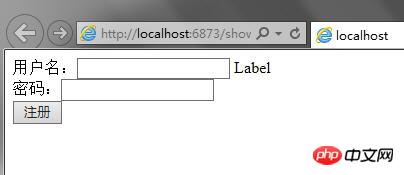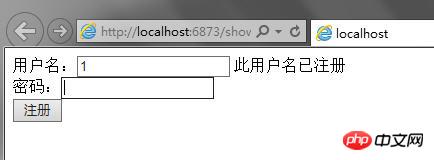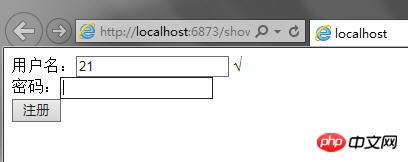 Backend Development
Backend Development
 PHP Tutorial
PHP Tutorial
 Handwritten Ajax example method to implement asynchronous refresh
Handwritten Ajax example method to implement asynchronous refresh
Handwritten Ajax example method to implement asynchronous refresh
The so-called asynchronous refresh means updating the data without refreshing the entire web page. Only through js can Ajax be implemented, and then asynchronous refresh can be implemented. This article mainly teaches you how to implement asynchronous refresh by handwriting Ajax. It has certain reference value. Interested friends can refer to it. I hope it can help everyone.
The difference between form submission data and Ajax submission data: form submission is the submission of data in the entire page. After submitting the data, the previous page will be discarded (refresh the page); ajax extracts certain data from the current page and Submit it and receive the returned data. After processing, it will be displayed on the current page (without refreshing the page).
[Example]==Verify whether the user name is repeated==
The idea of using Ajax: write js and Ajax code in the page to be refreshed, submit the data to another page, and Write query code in Page_Load and return the results to the refreshed page.
Interface

<script src="js/jquery-1.2.3.pack.js" type="text/javascript"></script>
<script src="js/jquery-1.2.3.pack.js" type="text/javascript"></script> <%--调用jquery--%>
<script>
$(document).ready(//当页面准备好加载完成的时候触发
function getval() {
$("#TextBox1").blur(function () {//当鼠标点击或离开时触发
var txt = $(this).val();//获取文本框的值
//使用ajax发送出来文本框的值
$.ajax( {
url: "De.aspx",
type: "POST",
data: {id:txt},
//接收数据库返回的信息
datatype: "xml",
success: function (data) {//data中的数据就是De页面中count的数据
var co = $(data).text();
if (parseInt(co) == 0) {
var lbl = document.getElementById("Label1");//利用js输出
lbl.innerHTML = "√";
} else {
var lbl = document.getElementById("Label1");
lbl.innerHTML = "此用户名已注册";
}
}
});
});
});
</script>
protected void Page_Load(object sender, EventArgs e)
{
//查询传过来的数据
DataClassesDataContext dc = new DataClassesDataContext();
string uid = Request["id"].ToString();
int count = dc.STOpro.Where(r => r.Stoid == int.Parse(uid)).Count();
//以xml形式返回
Response.Write("<?xml varsion='1.0'?>");
Response.Write("<count>" + count + "</count>");
Response.End();//关掉Response
}

php+jQuery+Ajax simply implements asynchronous page refresh_php example
ajax asynchronous refresh to update the database_jquery
jQuery uses $.ajax to perform asynchronous refresh (with demo download)_jquery
The above is the detailed content of Handwritten Ajax example method to implement asynchronous refresh. For more information, please follow other related articles on the PHP Chinese website!

Hot AI Tools

Undresser.AI Undress
AI-powered app for creating realistic nude photos

AI Clothes Remover
Online AI tool for removing clothes from photos.

Undress AI Tool
Undress images for free

Clothoff.io
AI clothes remover

Video Face Swap
Swap faces in any video effortlessly with our completely free AI face swap tool!

Hot Article

Hot Tools

Notepad++7.3.1
Easy-to-use and free code editor

SublimeText3 Chinese version
Chinese version, very easy to use

Zend Studio 13.0.1
Powerful PHP integrated development environment

Dreamweaver CS6
Visual web development tools

SublimeText3 Mac version
God-level code editing software (SublimeText3)

Hot Topics
 How to solve the 403 error encountered by jQuery AJAX request
Feb 20, 2024 am 10:07 AM
How to solve the 403 error encountered by jQuery AJAX request
Feb 20, 2024 am 10:07 AM
Title: Methods and code examples to resolve 403 errors in jQuery AJAX requests. The 403 error refers to a request that the server prohibits access to a resource. This error usually occurs because the request lacks permissions or is rejected by the server. When making jQueryAJAX requests, you sometimes encounter this situation. This article will introduce how to solve this problem and provide code examples. Solution: Check permissions: First ensure that the requested URL address is correct and verify that you have sufficient permissions to access the resource.
 How to solve jQuery AJAX request 403 error
Feb 19, 2024 pm 05:55 PM
How to solve jQuery AJAX request 403 error
Feb 19, 2024 pm 05:55 PM
jQuery is a popular JavaScript library used to simplify client-side development. AJAX is a technology that sends asynchronous requests and interacts with the server without reloading the entire web page. However, when using jQuery to make AJAX requests, you sometimes encounter 403 errors. 403 errors are usually server-denied access errors, possibly due to security policy or permission issues. In this article, we will discuss how to resolve jQueryAJAX request encountering 403 error
 PHP and Ajax: Building an autocomplete suggestion engine
Jun 02, 2024 pm 08:39 PM
PHP and Ajax: Building an autocomplete suggestion engine
Jun 02, 2024 pm 08:39 PM
Build an autocomplete suggestion engine using PHP and Ajax: Server-side script: handles Ajax requests and returns suggestions (autocomplete.php). Client script: Send Ajax request and display suggestions (autocomplete.js). Practical case: Include script in HTML page and specify search-input element identifier.
 How to solve the problem of jQuery AJAX error 403?
Feb 23, 2024 pm 04:27 PM
How to solve the problem of jQuery AJAX error 403?
Feb 23, 2024 pm 04:27 PM
How to solve the problem of jQueryAJAX error 403? When developing web applications, jQuery is often used to send asynchronous requests. However, sometimes you may encounter error code 403 when using jQueryAJAX, indicating that access is forbidden by the server. This is usually caused by server-side security settings, but there are ways to work around it. This article will introduce how to solve the problem of jQueryAJAX error 403 and provide specific code examples. 1. to make
 How to get variables from PHP method using Ajax?
Mar 09, 2024 pm 05:36 PM
How to get variables from PHP method using Ajax?
Mar 09, 2024 pm 05:36 PM
Using Ajax to obtain variables from PHP methods is a common scenario in web development. Through Ajax, the page can be dynamically obtained without refreshing the data. In this article, we will introduce how to use Ajax to get variables from PHP methods, and provide specific code examples. First, we need to write a PHP file to handle the Ajax request and return the required variables. Here is sample code for a simple PHP file getData.php:
 Advanced Guide to Python asyncio: From Beginner to Expert
Mar 04, 2024 am 09:43 AM
Advanced Guide to Python asyncio: From Beginner to Expert
Mar 04, 2024 am 09:43 AM
Concurrent and Asynchronous Programming Concurrent programming deals with multiple tasks executing simultaneously, asynchronous programming is a type of concurrent programming in which tasks do not block threads. asyncio is a library for asynchronous programming in python, which allows programs to perform I/O operations without blocking the main thread. Event loop The core of asyncio is the event loop, which monitors I/O events and schedules corresponding tasks. When a coroutine is ready, the event loop executes it until it waits for I/O operations. It then pauses the coroutine and continues executing other coroutines. Coroutines Coroutines are functions that can pause and resume execution. The asyncdef keyword is used to create coroutines. The coroutine uses the await keyword to wait for the I/O operation to complete. The following basics of asyncio
 PHP vs. Ajax: Solutions for creating dynamically loaded content
Jun 06, 2024 pm 01:12 PM
PHP vs. Ajax: Solutions for creating dynamically loaded content
Jun 06, 2024 pm 01:12 PM
Ajax (Asynchronous JavaScript and XML) allows adding dynamic content without reloading the page. Using PHP and Ajax, you can dynamically load a product list: HTML creates a page with a container element, and the Ajax request adds the data to that element after loading it. JavaScript uses Ajax to send a request to the server through XMLHttpRequest to obtain product data in JSON format from the server. PHP uses MySQL to query product data from the database and encode it into JSON format. JavaScript parses the JSON data and displays it in the page container. Clicking the button triggers an Ajax request to load the product list.
 Asynchronous and non-blocking technology in Java exception handling
May 01, 2024 pm 05:42 PM
Asynchronous and non-blocking technology in Java exception handling
May 01, 2024 pm 05:42 PM
Asynchronous and non-blocking techniques can be used to complement traditional exception handling, allowing the creation of more responsive and efficient Java applications: Asynchronous exception handling: Handling exceptions in another thread or process, allowing the main thread to continue executing, avoiding blocking. Non-blocking exception handling: involves event-driven exception handling when an I/O operation goes wrong, avoiding blocking threads and allowing the event loop to handle exceptions.





